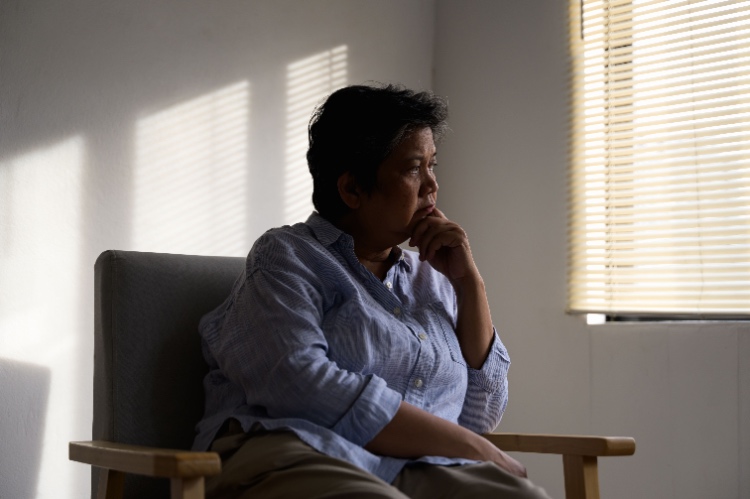
Life experiences shape us, and not all of those experiences are easy to carry. Trauma from the past, whether it was a difficult childhood, military service, a serious accident, or another painful event, doesn’t always stay in the past. For some older adults, those memories and feelings resurface later in life, often when life slows down or new challenges arise.
This can feel confusing or overwhelming. You may wonder why old wounds are coming back now, decades later. The truth is, aging can create conditions where trauma that was once buried or managed begins to reappear.
Table of Contents
- Why Trauma Can Reappear Later in Life
- Common Triggers in Older Adulthood
- How Resurfaced Trauma Affects Emotional Health
- The Connection Between Trauma and Physical Health
- Signs That Past Trauma May Be Returning
- Healthy Ways to Cope With Resurfaced Trauma
- The Role of Counseling in Healing
- Finding Peace and Support With Blue Moon Senior Counseling
- Frequently Asked Questions (FAQ)
Why Trauma Can Reappear Later in Life
As people move into later years, several changes can make space for trauma to come forward again. Retirement often brings more quiet time and fewer distractions. Health issues or losses may stir up old emotions. And as people reflect on their lives, memories, both joyful and painful, can rise to the surface.
Trauma that wasn’t fully processed earlier in life may show up in new ways, sometimes even stronger than before. This doesn’t mean you’ve done anything wrong. It means your mind and body are signaling that healing may still be needed.
Common Triggers in Older Adulthood
Certain life events in later years can directly trigger the return of old trauma. These experiences often overlap with normal aging, but the emotions they stir up may feel as if they belong to another time.
Loss of Loved Ones
The death of a spouse, sibling, or close friend is deeply painful in its own right. But grief in later years often awakens earlier grief that was never fully processed. Losing a partner may bring back the sorrow of a parent’s death decades ago, layering old sadness on top of new grief.
Changes in Independence
Losing the ability to drive, needing daily assistance, or moving into assisted living can feel like a loss of freedom. These moments may also echo earlier times when control was taken away, such as during illness, military service, or childhood hardship. The emotions tied to past helplessness can resurface alongside current challenges.
Retirement or Routine Changes
Stepping away from a lifelong career or caregiving role can leave you with unexpected emptiness. Without familiar responsibilities or structure, quiet time can create space for long-buried memories to return. For some, this transition also raises questions about purpose and identity, which can make past struggles feel fresh again.
Medical Treatments or Illness
Medical care in later years can be particularly triggering. The sterile smell of a hospital, the sound of medical equipment, or the experience of relying on others for care can all stir old traumas tied to injury, illness, or even caregiving experiences. A decline in health itself can feel like a loss of control, intensifying the impact of past memories.
Recognizing these triggers won’t make them disappear, but it provides clarity. Understanding why a strong reaction surfaces helps you see it not as weakness, but as a natural response rooted in your history.
How Resurfaced Trauma Affects Emotional Health
Trauma that reappears in later years often reshapes itself, changing the way you feel and interact with the world. Unlike normal ups and downs, these emotional shifts may linger or feel more intense than expected.
- Sadness that feels heavier than expected. This sadness may be about the present, but it also carries weight from the past. You may feel you’re grieving not only what you’ve just lost, but everything you’ve lost before.
- Anxiety and unease. Trauma primes the body to stay alert. Even when you’re safe, you may feel restless or worried, as if danger is around the corner. Familiar places may suddenly feel unsettling.
- Irritability or mood swings. Emotions may swing quickly, and small frustrations can bring stronger reactions than you intend. These changes may cause tension with loved ones and add guilt on top of the frustration.
- Nightmares or intrusive thoughts. Past events may reappear in dreams or interrupt your day without warning. The mind treats them as present, even though the events are long past.
- Numbness or withdrawal. Sometimes the opposite happens: instead of heightened emotions, you may feel disconnected from your feelings or from the people around you.
Additionally, Studies show that over 50% of people with depression have also been exposed to some form of traumatic experiences during their childhood.
The Connection Between Trauma and Physical Health
Trauma doesn’t just live in memories, it also shows up in the body. For older adults, resurfaced trauma can have clear physical effects that go beyond ordinary aging. Research also shows that traumas experienced in adulthood, compared to traumas experienced in childhood appear to cause more damage to an older person’s health.
Sleep and Fatigue
Unresolved trauma often disturbs sleep. Nightmares, racing thoughts, or restlessness may keep you awake. Without deep rest, fatigue builds, leaving less energy for daily tasks and increasing vulnerability to stress.
Pain and Sensitivity
Chronic pain often worsens under emotional strain. Arthritis may flare, headaches may increase, and muscles may feel tight. The body holds tension from trauma in ways that aren’t always obvious but can be felt every day.
Digestive and Muscle Tension
Stress hormones affect the stomach and muscles directly. This can result in nausea, indigestion, or persistent tightness in the shoulders, back, or neck. Over time, the constant strain leaves the body feeling sore and unwell.
Impact on Chronic Illness
Stress and trauma weaken the immune system and place strain on the heart and blood vessels. Conditions such as diabetes, high blood pressure, and heart disease often become harder to manage during times of resurfaced trauma.
Signs That Past Trauma May Be Returning
Unlike emotional health changes, which focus on how you feel, the signs of resurfaced trauma are the practical clues that something deeper is happening. These signals often appear in daily life, sometimes without explanation:
- Memories or flashbacks that catch you off guard and leave you unsettled
- Avoidance of certain places, people, or topics, even if you don’t know why
- Restless sleep, vivid dreams, or nightmares that leave you drained in the morning
- A sense of fear, anxiety, or hopelessness that feels unrelated to your current situation
- Emotional outbursts or panic that seem stronger than the situation calls for
Healthy Ways to Cope With Resurfaced Trauma
Coping with resurfaced trauma is not about “moving on” or forgetting what happened. It’s about finding ways to live with the memories and emotions so they no longer control your present. Different strategies can help:
Stay Connected
Isolation makes trauma feel heavier, while connection helps lighten the load. Talking with trusted family members, friends, or people in your community provides comfort and reassurance that you don’t have to carry the weight alone. This might mean calling a sibling every evening, meeting a neighbor for coffee once a week, or joining a group at your local senior center. Even short, regular interactions — a phone call, a walk with a friend, or a shared meal — can lift your mood and remind you that support is close at hand.
Build Calming Practices
Creating calming routines can help your body and mind settle after difficult days. Simple practices like deep breathing, stretching, meditation, or prayer calm the nervous system and ease stress. For example, you might try taking five minutes before bed to sit quietly and focus on slow, steady breaths. Or, begin the morning with gentle stretches while listening to soft music. Practicing these habits regularly, not just in moments of crisis, helps build a steady sense of peace that carries into daily life.
Care for Your Body With Food and Movement
What you eat and how you move play an important role in how you feel. A balanced diet with fresh fruits, vegetables, whole grains, and lean proteins supports energy and steadier moods. Studies show that exercise boosts endorphins that ease stress, while a healthy diet supports brain health and balance. Walking, swimming, or chair yoga all help release tension while improving sleep and circulation. Even a short walk after dinner or light stretches in the morning can make a noticeable difference in both body and mind.
Express Through Creativity
When words aren’t enough, creative outlets provide another way to release emotions. Writing in a journal can bring clarity to racing thoughts. Painting, crafting, or playing music allows feelings to take shape in ways that are sometimes easier than talking. Some people create memory books or scrapbooks, blending photos and stories as a way of honoring their experiences. Creative expression doesn’t have to be perfect or polished, it’s about finding a safe, personal way to process what’s inside and transform it into something meaningful.
The Role of Counseling in Healing
Counseling can be especially valuable when trauma resurfaces. A licensed Medicare therapist provides a safe place to share your story, explore your feelings, and learn coping tools. You don’t have to relive every detail to begin healing, sometimes the focus is simply on managing how the trauma is affecting your life now.
For older adults, counseling can also help connect the dots between past trauma and current challenges, such as health changes, grief, or loneliness. Having someone walk with you through the process makes it easier to face difficult emotions and find strength again.
Finding Peace and Support With Blue Moon Senior Counseling
Trauma may resurface later in life, but it does not have to control the years ahead. With support, it’s possible to face old wounds, lessen their weight, and make space for peace in the present.
If you’re noticing that memories or feelings from the past are making life harder today, you don’t have to carry them alone. Blue Moon Senior Counseling offers compassionate geriatric counseling services, providing a safe space to work through trauma and rediscover hope. Reaching out for help is a brave step, and it can bring relief, healing, and renewed peace. Contact our team today to get started.
Frequently Asked Questions (FAQ)
- Why does trauma come back later in life?
Trauma can resurface when life slows down, when health challenges arise, or when major changes trigger old emotions. Aging can open space for memories that weren’t fully processed earlier. - Is it normal to have flashbacks or nightmares about events from decades ago?
Yes. For many older adults, past trauma can reappear in the form of flashbacks, nightmares, or sudden emotional reactions. This is the mind’s way of signaling unresolved pain. - Can resurfaced trauma affect physical health?
Absolutely. Trauma can contribute to fatigue, sleep problems, tension, and even worsening of chronic conditions. Healing emotionally often improves physical well-being too. - What can I do when past trauma feels overwhelming?
Gentle self-care practices like breathing exercises, journaling, or talking with a supportive friend can help. Counseling is also a strong option for long-term support. - How can counseling help with past trauma?
Counseling provides a safe space to talk about your experiences, reduce their emotional weight, and learn coping tools. It helps older adults connect past events to present challenges and work toward peace.








